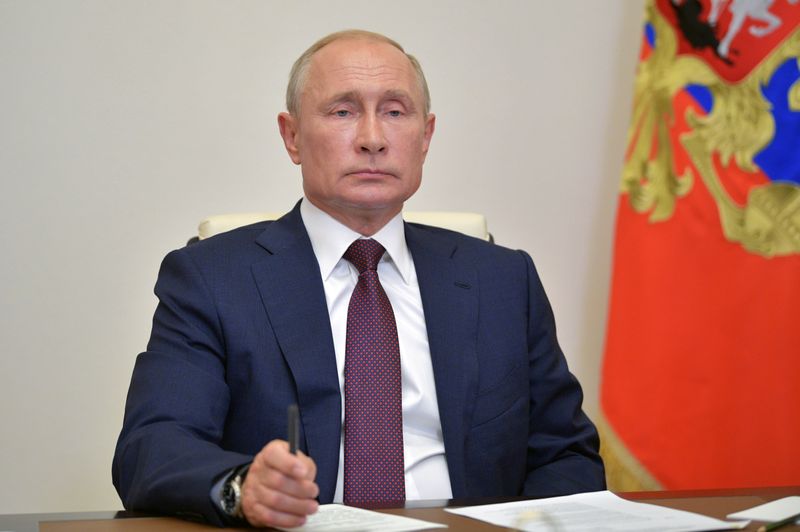By Andrey Ostroukh and Karin Strohecker
MOSCOW/LONDON (Reuters) - The prospect of President Vladimir Putin staying in the Kremlin until 2036 does not seem to be deterring buyers of Russia's high-yielding sovereign bonds as investors focus on economic fundamentals and political stability rather the risk of policy stagnation.
Investors in Russia are no strangers to shocks, having seen the country's markets roiled in recent years by sanctions and oil price collapses.
Yet very little of this has taken the shine off rouble-denominated government debt - so-called OFZs - thanks to the Russia's low indebtedness, prudent monetary and fiscal rules and the world's fourth largest FX reserves.
Now, constitutional changes that could extend the rule of Putin, who has been in power since 2000, as well as Moscow's plans to funds its post-pandemic recovery program have shone a fresh spotlight on the $135 billion OFZ market.
Few investors have expressed concern about Putin - who will turn 84 in 2036 - staying in power for so long, though this is not unusual for emerging markets where many prefer the stability of long-standing rulers to the ebb and flow of frequent policy change, as long as fiscal policy is sound.
"It's mixed news - on one hand you are always concerned when a leader is extending his time in office by hook or crook," said Kevin Daly, senior investment manager at Aberdeen Standard Investments in London, whose firm holds OFZs.
"On the other hand you have to give credit where credit is due in terms of the fiscal management under his (Putin) leadership, which has been prudent."
Foreign investors currently hold $43 billion worth of OFZs or around a third of sovereign rouble bonds.
Many enjoy the carry trade when they borrow dollars cheaply, convert them into roubles and invest in OFZs with yields of around 6% on a 10-year horizon (RU10YT=RR).
Russian interest rates are well above those measured by JPMorgan (NYSE:JPM)'s widely-tracked Government Bond Index Emerging Markets Global Diversified which hit an all-time low of 2.65%, according to analysts.
Graphic: Government bond yields of Russia, Brazil, Mexico and the United Statess https://fingfx.thomsonreuters.com/gfx/mkt/rlgpdladnpo/GOVT%20bonds.jpg
And in a world where interest rates have plunged ever lower as policymakers around the globe try to kickstart economies flattened by the coronavirus pandemic, this is an attractive play for many.
"Russian bonds are the only bonds I would buy now because they have high interest rates," veteran investor Jim Rogers, who has invested in OFZs, told Reuters.
Russia needs its investors on side: Moscow wants to double its OFZ sales to $71 billion to steer through the recession. And bond buyers seem happy enough to comply.
A lengthy extension of Putin's rule did not seem to be a significant issue or the markets would have already repriced the risk, said Natasha Smirnova, sovereign portfolio manager for emerging markets fixed income at PineBridge Investments in London.
"There are no immediate alternatives to Putin and he is still popular even though support has been declining with an understandable desire for new fresh faces."
Russian OFZs have become a mainstay for many international emerging market investors since it became possible for foreigners to settle the asset through Euroclear in 2012.
Western sanctions against Moscow or Russian individuals over annexation of Crimea in 2014 only temporarily dented the share of rouble government bonds held by foreigners.
With the central bank recently switching to a more accommodative monetary policy stance - raising the prospect of more rate cuts - foreigners have bought into OFZ bonds before their prices go up, said a bond trader at a major western bank in Moscow.
The latest cut in Russia's key rate to an all-time low of 4.5% is not expected to see investors pull out of OFZs, central bank governor Elvira Nabiullina said last month, adding she was confident that all $71 billion set by the finance ministry for this year will be raised.
Graphic: Russia's OFZ landscape https://fingfx.thomsonreuters.com/gfx/mkt/bdwpkalxjpm/OFZ-rate-inflation.jpg
Over the past 10 years almost all domestic political developments were a "non-event" for investors who pay more attention to sanctions, said Igor Burlakov, chief business officer at Sova Capital in London.
And while sanctions are the single biggest risk to Russian assets, investors have learned to look beyond them.
"It is a permanent risk overhang, with occasional flare-ups, but the magnitude becomes smaller with each wave or yet another sanctions headline," said PineBridge's Smirnova.

($1 = 70.8977 roubles)